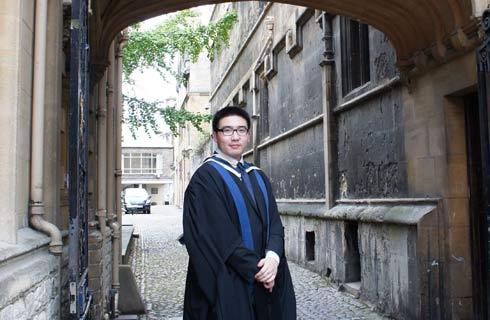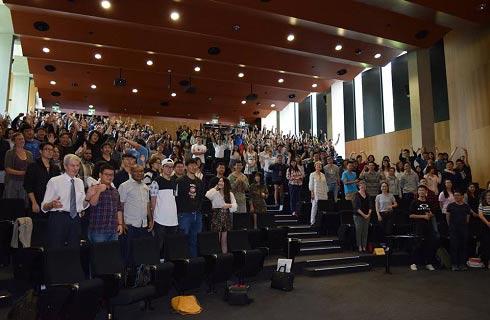PhD in Linguistics and Translation - Formal linguistics

学历文凭
Ph.D.

专业院系
语言文学

开学时间

课程时长

课程学费

国际学生入学条件
Applicants to research degree programmes should normally have at least a first class or an upper second class bachelors honours degree in an appropriate discipline
IELTS (International English Language Testing System) Academic at 6.0 overall with no less than 5.5 in each component skill
TOEFL iBT (Test of English as a Foreign Language Internet-Based Test) at 87 overall with no less than 20 in listening, 20 in reading, 22 in speaking and 21 in writing
IELTS (International English Language Testing System) Academic at 6.0 overall with no less than 5.5 in each component skill
TOEFL iBT (Test of English as a Foreign Language Internet-Based Test) at 87 overall with no less than 20 in listening, 20 in reading, 22 in speaking and 21 in writing
IDP—雅思考试联合主办方

雅思考试总分
6.0
了解更多
- 雅思总分:6
- 托福网考总分:87
- 托福笔试总分:160
- 其他语言考试:PTE (Pearson Test of English) Academic at 60 overall with no less than 59 in any component
CRICOS代码:
申请截止日期:请 与IDP联系 以获取详细信息。
课程简介
Studying for your PhD in the School of Languages, Cultures and Societies means that you'll become an expert in a specialist area and develop high-quality research skills, which will prepare you for further research projects in addition to pursuing specialist career paths. As a postgraduate researcher, you'll conduct original research work under the guidance of your supervisors. You'll have regular meetings to monitor your progress and develop an initial training plan to make sure you are acquiring the appropriate skills for your research. Your initial priority is refining a research plan and establishing a feasible timescale for your project. During the early part of your PhD, you'll undertake a range of research methods modules to support your research activities. For your first year (or 18 months if you are part-time) you'll be enrolled as a provisional postgraduate reseaarcher, you'll develop a detailed research proposal and write a literature review. This work is submitted to a panel of examiners who will assess it and provide you with feedback and advice on the progress of your research. This is called 'transfer' which is an important means of monitoring the progress of your work and assessing whether your proposal has enough weight to be accurately explored through a PhD research path. After successful transfer, you'll enrol as a full postgraduate researcher, complete your research and write a thesis of approximately 100,000 words. The degree of Doctor of Philosophy is awarded on the basis of this thesis, and your viva voce, where you'll present and discuss the rationale, methods and findings of your original study with an examining panel.<br><br>Research in formal linguistics encompasses syntax / semantics and phonetics / phonology. Our specific interests in syntax and semantics research are centred around the following broad themes: The interface between syntax and morphology (especially animacy, and the relationship between argument structure, event structure, and case), The interface between syntax and information structure (especially topichood, exhaustivity, and fragments), Core syntax (especially locality, defective heads, resumptive pronouns), Syntactic aspects of language acquisition and language impairment and Syntactic aspects of language evolution and language documentation of endangered languages (especially Uralic and South Arabian languages).
相关申请

预科

奖学金

实习机会

在校学习

跨境学习

校园授课-线上开始

在线/远程学习
学校排名
世界排名
153
数据源:泰晤士高等教育世界大学排名
关于利兹大学

利兹大学在《2025 完整大学指南》中名列英国大学前25名,在2025 QS世界大学排名中名列世界前100名。它也是罗素大学集团大学之一,这是英国著名的顶尖研究密集型大学名单。该大学的学生满意度很高,在英国排名第三(2018年《泰晤士报高等教育学生体验调查》)。作为同一项调查的一部分,该大学的校园设施在英国排名第二,这是对学生发挥潜力的绝佳校园的认可。近年来,两栋新建筑投资超过1.2亿英镑。体育设施也被认为是世界级的。The Edge是一个为学生提供的令人难以置信的健身中心,包括一个25米的室内游泳池、攀岩墙和为不同体育活动设置的各种大厅。这是一所热情友好的大学,拥有充满活力、多样化的学生群体。事实上,来自世界130多个不同国家的13800多名国际学生在利兹大学学习。学生会是这个国家最活跃、最活跃的工会之一。学生可以加入300多个俱乐部和社团,利兹大学联盟(LUU)是英国第一个被全国学生联合会评为''优秀''的俱乐部和社团。
本校相关课程
生物多样性与保护

学历文凭
Masters Degree (Taught)
下一个开始日期
课程费用总额
统计博士学位

学历文凭
Ph.D.
下一个开始日期
课程费用总额
纯粹数学博士学位

学历文凭
Ph.D.
下一个开始日期
课程费用总额
应用数学博士学位

学历文凭
Ph.D.
下一个开始日期
课程费用总额
PhD in Geography

学历文凭
Ph.D.
下一个开始日期
课程费用总额
PhD in Microwave and Millimetre Wave Engineering

学历文凭
Ph.D.
下一个开始日期
课程费用总额
其他相关课程
中学11年级和12年级

马特·克里斯蒂学院
泰晤士高等教育世界大学排名:

学历文凭
Secondary School
下一个开始日期
课程费用总额
应用语言学硕士-应用语言学

昆士兰大学
泰晤士高等教育世界大学排名:80

学历文凭
Masters Degree (Coursework)
下一个开始日期
课程费用总额
国际研究学士-中文

昆士兰大学
泰晤士高等教育世界大学排名:80

学历文凭
Bachelor Degree
下一个开始日期
课程费用总额
脑与精神科学研究生文凭

悉尼大学
泰晤士高等教育世界大学排名:54

学历文凭
Graduate Diploma
下一个开始日期
课程费用总额
脑与精神科学研究生证书

悉尼大学
泰晤士高等教育世界大学排名:54

学历文凭
Graduate Certificate
下一个开始日期
课程费用总额
脑与精神科学硕士

悉尼大学
泰晤士高等教育世界大学排名:54

学历文凭
Masters Degree (Coursework)
下一个开始日期
课程费用总额




